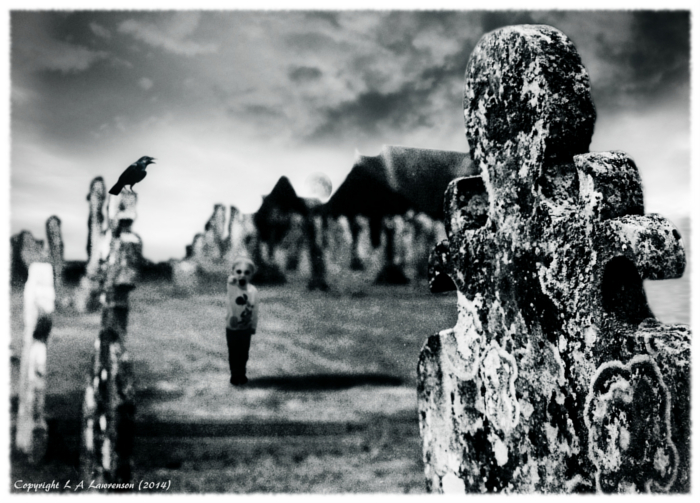HONORABLE MENTION, SUMMER 2017
The Ghost Story Supernatural Fiction Award
 Leslie Lawrenson “The Warning”
Leslie Lawrenson “The Warning”
BY PETRA McQUEEN
The noise blunders into her dream. She cries out, hand fluttering at her chest. Calm down, she thinks, it’s only a car coming along the lane. She drags back the covers and stands, feeling each stiff muscle, mouth thick with claggy breath. Opening the curtains, she sees a shiny vintage car. The noise, the sight of the car, familiar yet hazy, precipitates a slow dread. A locked memory shifts and threatens to break. She hugs her flannelette nightie close, telling herself that the unease is only the lingering remnants of the night—a dream in which the land shifted and changed in the wind: sea-corroded edges, swamped beaches, swallowed marsh and sand.
The car’s rumble rattles her sash windows, thrums up through the floorboards. With a stutter, the engine ceases. Maggie breathes easier. She watches as a man gets out, dressed in khaki. A twitcher, no doubt, come for a holiday in the cottage next door. A fool, whoever he is, driving an old thing like that. He reaches into the back of the car, takes out a spade and a suitcase. A flash of scarlet darts out. It’s a young boy in a woolly red jumper. With a thump of shock, Maggie steps from the window as though she’s done something wrong. As she palms tights onto her legs and shrugs into her clothes, her throat feels thick with unshed tears. Lines come to her from a poem: Four foot something/ something every year of something.
The words nag at her as she pads down the stairs. Which poem do they come from? Why are they so insistent? Unwilling to use the laptop her daughter foisted on her last Christmas, she lets the questions go and thinks of the day ahead. Today her granddaughter, Evie, is visiting. They’ll stick cotton wool clouds on blue sugar paper.
After toast and marmalade, Maggie opens the back door. She tucks her chin against the cold and shuffles along the garden path toward the shed for her painting supplies. As a child, visiting the holiday cottage with her parents, she’d been afraid of the shadowy, dank yard and the rising distant dunes. For years after inheriting the place, Maggie never visited. But she hadn’t ever got round to selling it, either—was reluctant, even, to think of the village. But now that her daughter and her family live close by, Maggie stays occasionally. Evie is worth anything.
She gathers straws and paints, paper and cotton wool. As she steps outside the shed, she is startled by the little boy bouncing a ball against her fence.
“Oh.” She puts her hand to her heart.
The boy runs toward the dunes and flashes through trunks of silver birch. As he disappears from sight, a gust of wind blows back her hair, tugs at her skirts. She shades her eyes from sharp breeze and low sun. Above the filigree of black branches, a bank of thick white cloud is rolling in. Should she tell her neighbour to fetch the boy? Or go herself? But she’s no age for wandering.
Evie rounds the corner and bursts in through the garden gate, curls bouncing. ‘There’s a big fog coming. Big.”
Her daughter comes to the fence. “Hi Mum, I better leave before it sets in.” She gives a brief kiss and Maggie watches her go, relieved. Not that she doesn’t love Amanda, but she holds a raft of unwritten rules about childcare Maggie doesn’t understand. Why not give the child some chocolate as a treat?
Maggie steers Evie towards the house. She puts down paints and paper and hugs her granddaughter close. The cold is trapped in her curls. “Let’s have a cup of tea.”
“Can I go out, Granny? Can I?”
“I’ll get my coat and bag.”
When Maggie emerges from the cupboard under the stairs, Evie has disappeared. The front door is wide open. Maggie rushes out into a soft, wet wall of white. All is cloud and the damp smell of winter.
“Evie?”
Smudges move against the brume. Evie and the small red figure of the little boy. The poem plays again: Four foot. Still she can’t remember the words. Evie shoots past the boy. “Come and get me!”
Maggie scrambles to lock the door, shouting over her shoulder, “Hold on!”
The roar of a car starting makes her jump. It semaphores, once more, the memory so carefully packed away. She knows it only as a well of dread she must not to peer into. “Children! Be careful!”
They don’t reply.
The car crawls towards her, headlamps on, light refracting against the wall of fog. Driving in this! Does the man have no sense? And leaving the boy alone to play in the fog! What kind of person does that?
She rushes ahead of the car. “Evie, where are you?” Close by is a blur of a tree, a bush, a garden gate. “Evie?” The car is behind her, engine thrumming, wheels crunching on grit. She feels it at her heels. An iron monster. “Evie! Please!”
“Granny, I’m here.”
She bustles her away from the road. “You silly, silly girl!”
The car drives past slowly, rocking on uneven ground. Maggie wants to hammer on the windscreen but she mustn’t scare Evie. She darts down, grasping Evie’s shoulders. “Where’s the little boy?”
“You’re hurting.”
Over Evie’s shoulder, she catches a blur of red in the distance. “Hello!”
Evie giggles. Maggie takes her small, warm hand and trots after the boy. Every time Maggie shouts “Helloo!,” Evie copies her in a high pitched echo. The boy doesn’t turn. After a few minutes, Maggie gives up. She watches as the boy is swallowed by fog. He’s too little to be on his own out here, in this unfamiliar world. But he’s too far away to be any of her business.
She turns back to Evie. “Let’s go home.” But which way? She doesn’t recognise a thing. Everything looks ancient and half-formed. A tree is a pagan god—twisted, lightning-struck, black branches reaching and fading into the white.
Maggie guesses the direction, takes Evie’s hand and walks tentatively. It seems as though they are travelling under the only light in an opaque, dingy world.
Maggie spots a stone lion leering at her through the vapour. The Everson’s gatepost. Thank God. She knows where she is. Following the boy, they must’ve ended up on the dog-leg of Church Lane.
“Not long now.”
It’s not so murky here, and they can see the outlines of the houses set back from the road. It occurs to Maggie that the fog is not homogeneous. If it were possible to map it, you could walk the honeycomb, sidle cliffs of cloud and emerge in clear caverns. If you knew what you were doing, you needn’t be lost at all.
They turn a corner. “Granny, look!” The black tower of the church rises out of a thin cloak of mist. Evie pulls Maggie’s hand. “Let’s go see.”
Maggie shakes her head, “It’s not the way.”
“But I want to.”
As though in a dream, Maggie lets Evie lead her to the church. She has the sensation of watching herself disappearing into thick mist. She is swallowed, erased, eradicated.
A noise starts: a scrape, scrape. Someone is digging a grave. No, how silly. Nobody has been buried in the churchyard for decades. And besides, the noise isn’t coming from the graveyard, it’s coming from opposite the church gates.
They turn right along Golgotha Road. As they walk towards the noise, the jelly-mould outline of the stationary vintage car comes into focus. She holds Evie’s hand tight. Next to the car, her neighbour is digging. Why? What business does he have here?
They reach the man.
“What are you doing?” Evie asks.
“I’m putting in footings for a bench.”
Maggie is about to berate him for leaving the little boy, when she sees the boy opposite, on the pavement at the church gates, bouncing a ball. He looks so small in the mist. A four foot something/ something every year of his life.
“It’s a memorial bench,” says the man. “For my twin. Killed in a hit and run. Almost fifty years ago now.”
Maggie catches her breath, feels the pressure of the fog bearing down on her, stirring secrets she’s tried so long to forget.
“But I’m daft. I’ve forgotten the concrete.” He picks up his shovel and walks to the car.
Maggie tugs Evie’s hand, pulls at her to come away. But the little girl is firmly planted, anchoring Maggie to this place, this time. The man drives past and turns left down Church Lane, a lane which leads nowhere except round back to the church, back to Golgotha Road. Through the mist, she hears the car negotiating corners, turning left, left, back to the road.
“Oh God!”
“Granny?”
It was the same car she’d driven all those years ago. Drunk and stupid, so young, only just passed her test. As she’d thundered along, high on life and hope, she’d never thought there would be a little boy, a little boy in the mist. The poem comes sharp and clear. A four foot coffin/ One for every year of his life.
No! thinks Maggie. No! Things will be different this time.
“Stay here!” she says to Evie. She lifts the girl and places her under a tree, her back against the trunk. “Stay right here!” She steps out to cross the road. As she does so, a bank of thick fog streams up the street. The boy is lost in a shroud of white. The thrumming roar comes closer, closer. The sound is in each wisp, each tendril; it slides into particles, strums molecules, fills the cavities of her bones.
The boy bounces the ball.
Thwank, thwank, thwank.
She tries to shout. The fog is in her mouth, at the back of her throat. A wind rises, blows her hair, tugs at her skirt. It clears a cave in the fog. She is at one end, the boy at the other. Mist coils about them. Thwank, thwank, thwank.
Now is the time to run. Now.
Her legs are lead. The thrum is louder, louder.
Why doesn’t she run?
The boy stumbles, ball skittering along the tarmac. He follows it, head down, almost dancing.
Out of the white, out of the fog, comes the car.
Now! Now!
Maggie speeds across the road.
“Granny! Wait!”
Evie runs too, after her granny, into the fog. Such a little girl. Only four years old.
 Petra McQueen is a writer and teacher. Her writing has appeared in The Saturday Evening Post, The Guardian, YOU Magazine, Writers’ Forum, Cabinet des Fées, and Earthlines among many other publications. She has won several prizes for her prose, including first prize in the National Association of Writers’ Groups Short Story Competition. She lives close to the mud-flats of North East Essex, UK with her large, lively family. She runs her own writing workshops, and is currently working on a novel.
Petra McQueen is a writer and teacher. Her writing has appeared in The Saturday Evening Post, The Guardian, YOU Magazine, Writers’ Forum, Cabinet des Fées, and Earthlines among many other publications. She has won several prizes for her prose, including first prize in the National Association of Writers’ Groups Short Story Competition. She lives close to the mud-flats of North East Essex, UK with her large, lively family. She runs her own writing workshops, and is currently working on a novel.
